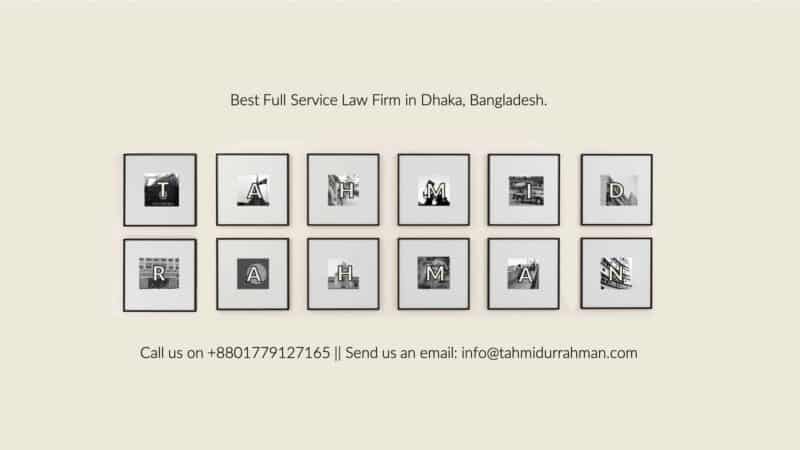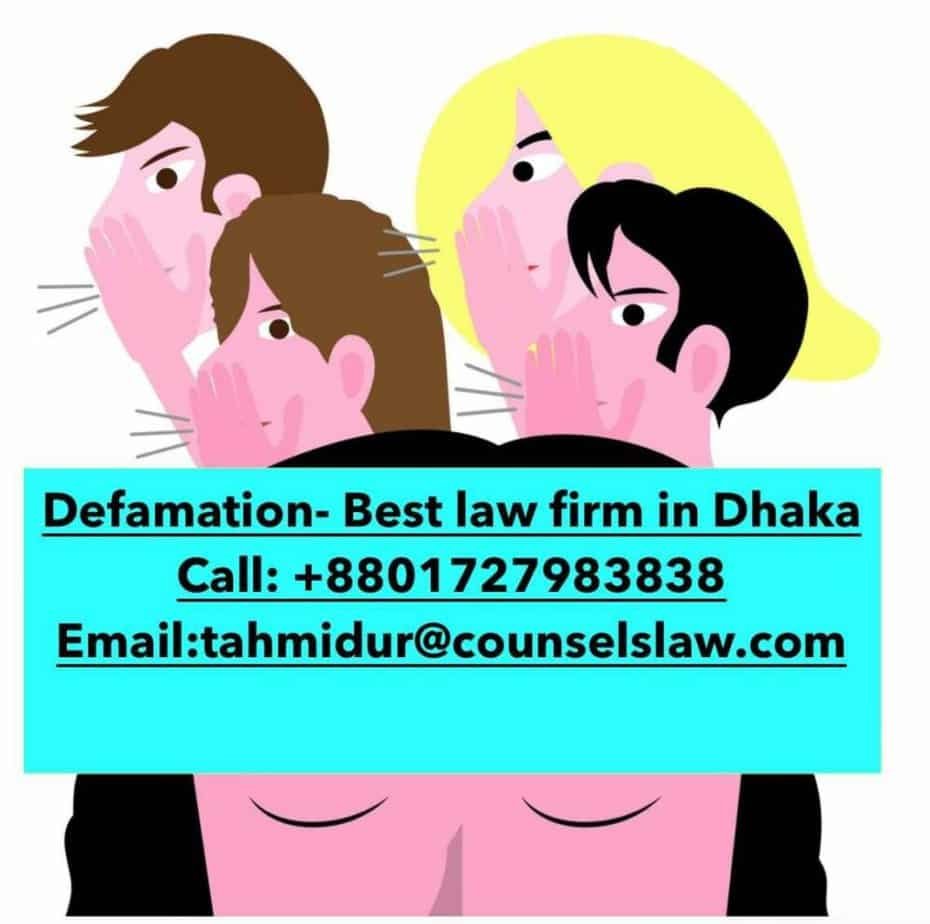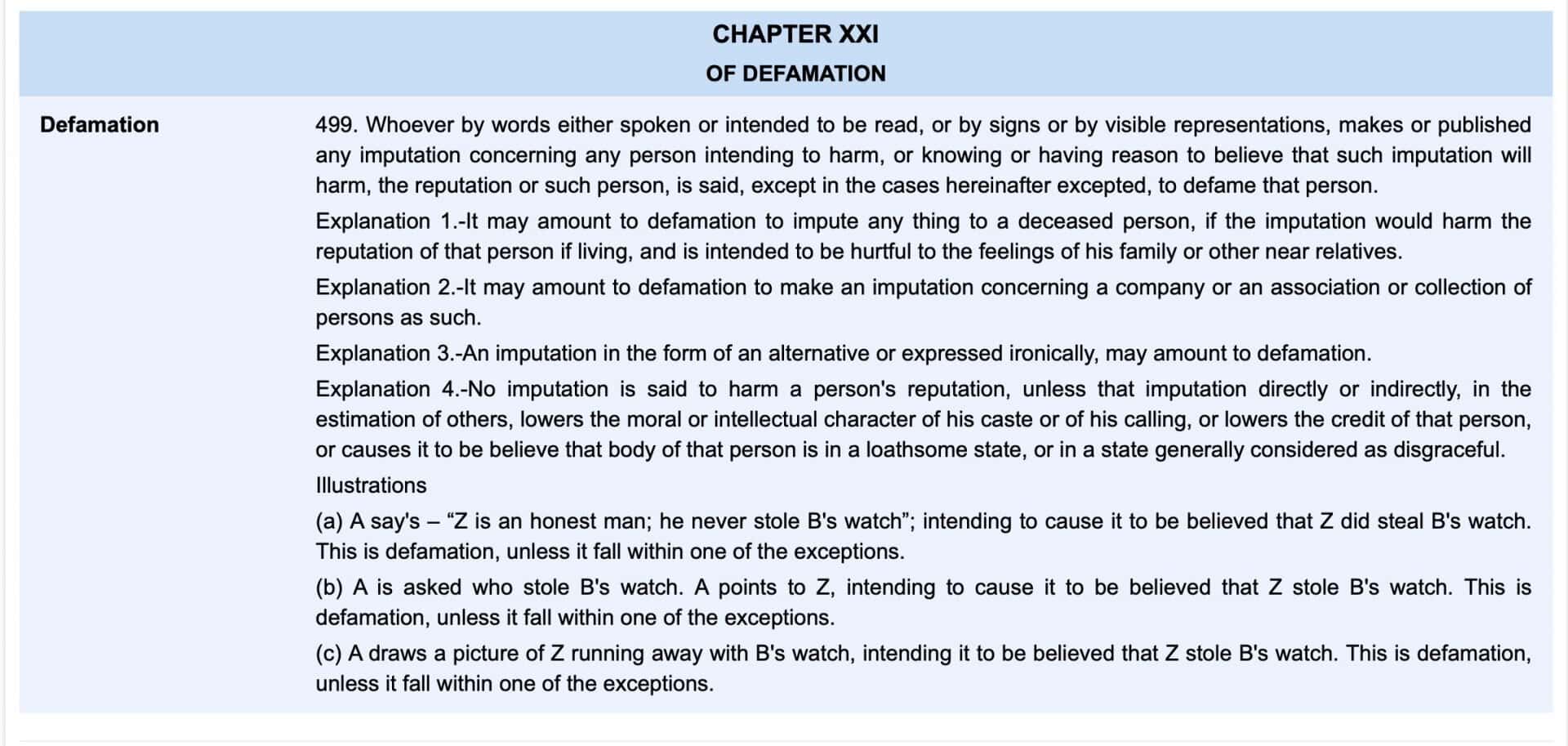Defamation Law in Bangladesh and regarding its offences and remedies| Everything you need to know

Tahmidur Rahman, Director and Senior Associate
20 Oct 2019
This post in will explain in details the Defamation Law in Bangladesh – offences and remedies, everything about defamation law that you need to know and be aware of.
Content Area
Find the subsections below, If you want to jump through specific sections instead of reading the whole article.

What is Defamation?
Defamation is a common legal term that refers to a person’s credibility being damaged unjustly. The word defamation is broken down into libel and slander in Common Law legal systems. The former applies to a publication of a defamatory document, whether in written form or by any other medium such as broadcasting. In comparison, Slander refers to defamation that is privately spoken and not maintained in any permanent way. For several developed nations defamation is prosecuted as a legal error under tort law.
Similarly, criminal defamation defines the case in which diffamation is an offense under state criminal law.
In these cases, suspected defamation would usually be charged by state advocates and trialed in the criminal justice system, with the prospect of imprisonment on conviction being levied. According to the Section 499 of the Penal Code of Bangladesh¸ whoever by words either spoken or intended to be read, or by signs or by visible representations, makes or publishes any imputation concerning any person intending to harm, or knowing or having reason to believe that such imputation will harm, the reputation of such person, is said to defame that person.
Defamation in International Law
In the United Kingdom and the EU, only people may make allegations about being ‘defamed’ in the Courts. Because their laws on defamation are meant primarily to preserve the individual right to a reputation, only an individual can sue for the defense of that right. The Government, branches of government, departments , agencies, religious organizations, and leaders of religious groups (unless personally defamed) can not sue for defamation.
The United Nations Special Rapporteur on the Promotion and Security of the Right to Freedom of Opinion and Speech is among a variety of international legal bodies that have stated that “criminal defamation laws should be repealed in favour of civil law, because the latter can provide sufficient protection for reputations …”
Due to the very sanctions that often accompany conviction, criminal defamation laws represent a potentially serious threat to freedom of expression. The ECHR has defined a set of very stringent protections to be enforced while a criminal defamation law exists in a statute in Amorim Giestas and Jesus Costa Bordalo v. Portugal(8J).
• If defamation is part of the criminal law, the criminal standard of proof, beyond a reasonable doubt, should be fully satisfied.
• Convictions for criminal defamation should only be secured when the allegedly defamatory statements are false, and when the mental element (mens rea) of the crime is satisfied.
• Penalties should not include imprisonment, nor should they entail other suspensions of the right to freedom of expression or the right to practice journalism.
• Should not resort to criminal law when a civil law alternative is readily available
Types of Defamation
Conventionally there are mainly 2 types of defamation in in the legal world. (Libel and Slander).
Bangladesh’s Penal Code 1860 also states that it can be a defamation to impute something to a deceased person if the imputation harms that person’s reputation if he lives, and is intended to harm his family or other close relatives’ feelings.
Making an imputation relating to a corporation or an organization or group of individuals as such can amount to defamation. An imputation in the form of an alternative, or ironically expressed, can amount to defamation. No imputation is said to injure the integrity of a individual unless that imputation directly or indirectly, in the opinion of others, diminishes the moral or intellectual character of his caste or title, or diminishes that person’s honor, or leads us to believe that that person’s body is in a loathsome condition, or in a condition commonly deemed disgraceful.
“Tahmidur Rahman Remura Wahid is Considered as one of the leading firms in Public Law in Dhaka, Bangladesh”
Bdlawfirms & Carpe Noctem Bangladesh
Libel- Defamation law in Bangladesh
- Publication of a false statement
- expressed in writing, printing or in some other permanent form
- tending to harm the reputation of another.
Slander- Defamation law in Bangladesh
A verbal statement, false and defamatory and tending to affect one’s good name and reputation. The elements of a slander are:
- That the statement complained of is false,
- defamatory,
- and that some special damage to the plaintiff has resulted from it.
Defamation as a criminal offence in Bangladesh
As it is stated earlier, Defamation in Bangladesh, unlike different countries, is considered a criminal crime and not a civil wrong. In addition, in diffamation criminal law, there is no difference between spoken and written words , given that the conditions set out in Section 499 of the Bangladesh Penal Code above are met. Since this is a criminal offence, however, the prosecution must prove beyond reasonable reason that the defendant has committed defamation.
Latest law concerning Defamation in Bangladesh
Section 57 of the ICT Act 2006 provides[12]: (1) If any person deliberately publishes or transmits or causes to be published or transmitted in the website or in electronic form any material which is fake and obscene or its effect is such as to tend to deprave and corrupt persons who are likely, having regard to all relevant circumstances, to read, see or hear the matter contained or embodied in it, or causes to deteriorate or creates possibility to deteriorate law and order, prejudice the image of the State or person or causes to hurt or may hurt religious belief or instigate against any person or organization, then this activity of his will be regarded as an offence.
(2) Whoever commits offence under sub-section (1) of this section he shall be punishable with imprisonment for a term which may extend to maximum 14 years and minimum 7 years and with the fine which may extend to taka ten crore.
This is the latest provision concerning defamation law in Bangladesh. It covers any publications made in electronic form. How ‘Tahmidur Rahman & TR Barristers in Bangladesh Associates’ help the purchaser of any land in Bangladesh:
Defences of Defamation Law in Bangladesh
Chapter 21 Section 499 of Bangladesh’s penal code provides that[11]:
“whoever by words either spoken or intended to be read, or by signs or by visible representations, makes or publish any imputation concerning any person intending to harm, or knowing or having the reason to believe that such imputation will harm, the former person will be liable to the latter.”
The statue also outlines a list of exceptions in regards to defamation law in Bangladesh, which might also work as the potential defences of defamation. Accordingly, it is not defamation:
1. It is not defamation to make statements about anything which is true concerning any person, if such statement is made for the public good.
2. It is not defamation to express in good faith any opinion whatever respecting the conduct of a public servant in the discharge of his public functions.
3. It is not defamation to express in good faith any opinion whatever respecting the conduct of any person touching any public question.
4. It is not defamation to publish a substantially true report of the proceedings of a Court of Justice, or of the result of any such proceedings.
5. It is not defamation to express in good faith any opinion whatever respecting the merits of any case, civil or criminal, which has been decided by a Court of Justice.
6. It is not defamation to express in good faith any opinion respecting the merits of any performance which its author has submitted to the judgment of the public.
7. It is not defamation in a person having authority over another, to pass in good faith any censure on the conduct of that other in matters to which such authority relates.
8. It is not defamation to prefer in good faith an accusation against any person to any of those who have lawful authority over that person with respect to the subject matter of accusation.
9. It is not defamation to make a comment on the character of another, provided that such comment is made in good faith for protecting the interest of the person making it, or of any other person, or for the public good.
10. It is not defamation to convey a caution, in good faith, to one person against another.

“It is not defamation to express in good faith any opinion whatever respecting the conduct of a public servant in the discharge of his public functions.”

Potential Punishment for Defamation Law in Bangladesh
As per the Bangladeshi Law, Whoever commits defamation shall be punished with simple imprisonment for a term which may extend up to 2 years and fine.
Tort and Defamation practice at TRW
The Barristers, Advocates, and lawyers at TRW Law chamber in Gulshan, Dhaka, Bangladesh are highly experienced at assisting clients in dealing with defamation and every aspects surrounding defamation. For queries or legal assistance, please reach us at:
E-mail: info@trfirm.com
Phone: +8801847220062 or +8801779127165
House 410, Road 29, Mohakhali DOHS
Want new articles before they get published?
Subscribe to our Awesome Newsletter.






